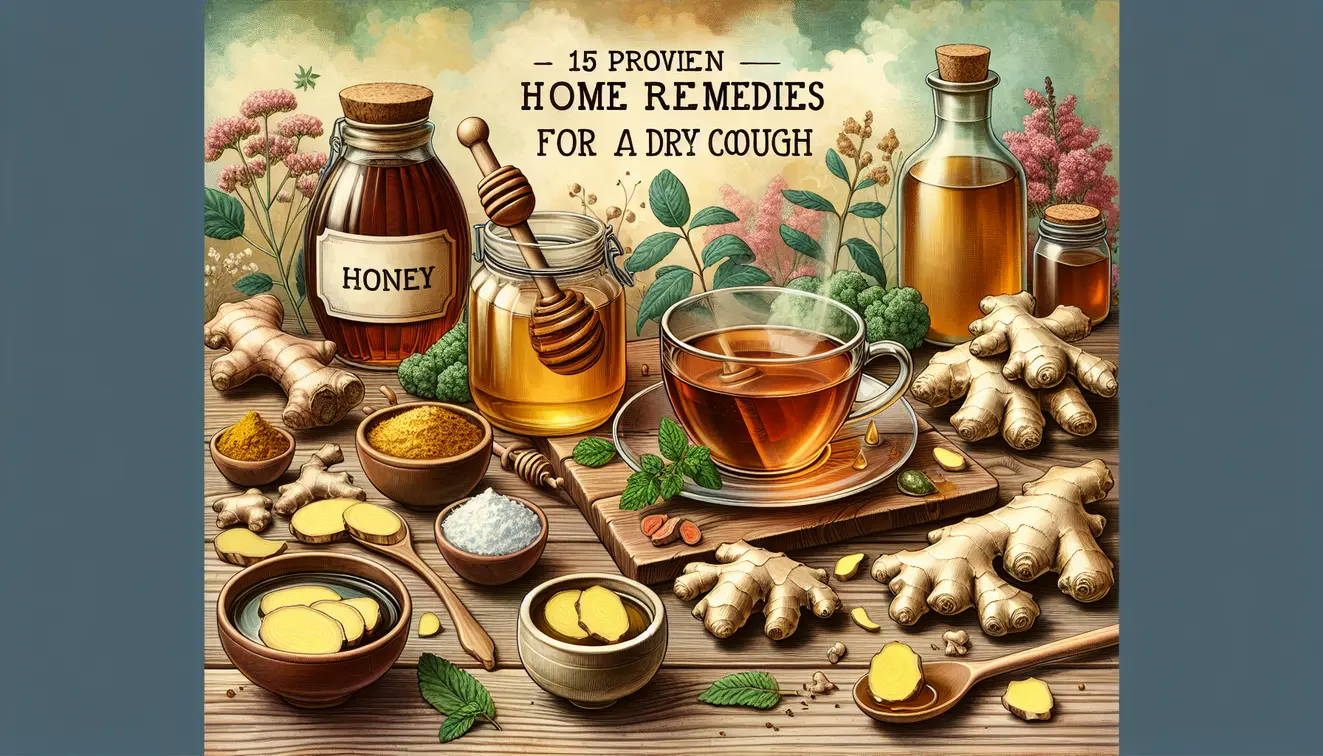15 Proven Home Remedies for a Dry Cough: Natural Relief Backed by Science and Tradition (2025 Guide)
Estimated reading time: 10 minutes
Key Takeaways
- A dry cough, often caused by viruses, allergies, or dry air, can be eased with accessible home remedies.
- Natural options like honey, ginger, and steam inhalation offer relief with scientific and traditional backing.
- Safety matters—avoid certain remedies for infants or if you have specific health conditions.
- Persistent coughs over three weeks or with severe symptoms need medical attention.
- Daily habits like hydration and humidifiers can prevent throat irritation from returning.
Table of Contents
- Introduction: Understanding a Dry Cough
- Section 1: What Causes a Dry Cough?
- Section 2: 15 Effective Home Remedies for Dry Cough Relief
- Section 3: The Science and Tradition Behind These Remedies
- Section 4: Safety Precautions for Using Home Remedies
- Section 5: Lifestyle Tips to Prevent and Manage a Dry Cough
- Section 6: Frequently Asked Questions
- Section 7: When Home Remedies Aren’t Enough
Introduction: Understanding a Dry Cough and the Need for Natural Remedies
A dry cough can be a real nuisance, tickling your throat without bringing up anything. Often called non-productive, it stems from irritations like viral infections, allergies, or even dry air. For many, it disrupts sleep and daily routines, making relief a top priority.
That’s where home remedies come in as a gentle, accessible solution. They’re often right in your kitchen, easy on the wallet, and carry fewer risks than over-the-counter drugs. At WikiHomeRemedies, we’re committed to guiding you with safe, research-supported options drawn from trusted sources like WHO and NIH.
Millions experience dry coughs yearly, with viral infections alone affecting a significant portion, according to global health data. It’s a common struggle, but relief doesn’t have to be complicated. In this guide, you’ll discover 15 effective home remedies, learn why they work, and get practical tips on staying safe while using them.
We’ll also cover prevention strategies and help you recognize when it’s time to consult a doctor. Let’s journey together toward soothing that stubborn cough with nature’s healing touch. For related relief options, explore additional natural solutions at WikiHomeRemedies Cold Remedies.
Section 1: What Causes a Dry Cough? Common Triggers and Concerns
Identifying the Root of Your Dry Cough
Before reaching for a remedy, it’s wise to understand what sparks a dry cough. Pinpointing the trigger can guide you to the most fitting solution. A dry cough often arises from simple, everyday factors, but sometimes it signals something more.
Common culprits include viral infections like the common cold, which irritate the throat. Allergies to pollen or dust can set off persistent coughing as your body reacts. Then there’s dry air or smoke, which can worsen throat discomfort, especially in winter months.
Certain health conditions play a role too. Asthma often brings a dry cough alongside wheezing, while postnasal drip from sinus issues can tickle the throat. Even acid reflux might sneak in as an unexpected cause, pushing stomach acid up to irritate airways.
Knowing these triggers helps tailor your approach for relief. Yet, it’s crucial to stay alert for warning signs. A cough lasting over three weeks, paired with fever or breathing trouble, means it’s time to seek medical insight.
Health experts, such as those at the Mayo Clinic, stress the importance of early attention to such symptoms. Let’s explore these causes a bit deeper to help you connect the dots. If sinus issues contribute to your cough, check out related tips at WikiHomeRemedies Sinus Remedies.
Viral Infections and Allergies
Viruses behind colds or flu often lead to a dry cough as the throat battles inflammation. Allergens, whether from seasonal pollen or household dust, prompt your immune system to overreact, irritating airways. These are among the top reasons many face this issue.
Environmental Factors and Asthma
Dry indoor air, especially in colder seasons, strips moisture from your throat. Smoke or pollution can amplify this, triggering coughs in sensitive individuals. Asthma, a chronic airway condition, often presents with a persistent dry cough as a key symptom.
Postnasal Drip and Other Health Conditions
When sinuses overproduce mucus, it drips down, irritating the throat into a dry cough. Reflux issues, where stomach acid rises, can mimic similar irritation. These less obvious causes remind us to look beyond the surface when coughs linger.
Understanding these roots lays the groundwork for effective relief. Now, let’s move to natural remedies that target this irritation head-on.
Section 2: 15 Effective Home Remedies for Dry Cough Relief
Natural Solutions for Soothing Throat Irritation
When a dry cough strikes, turning to nature’s offerings can bring comfort without complexity. Below, you’ll find 15 remedies grounded in science and tradition, each chosen to ease throat irritation safely. Let’s walk through them with clear steps to help you find relief at home.
1. Honey – Nature’s Soothing Sweetener
Honey has long been a go-to for calming coughs with its thick, coating texture. Studies from the National Institutes of Health show its antimicrobial traits help fight irritation. It’s a simple, sweet way to quiet a dry cough.
Mix one to two tablespoons of raw honey in warm water or tea. Sip this twice daily, especially before bed, to coat your throat. Avoid giving honey to children under one year due to botulism risks.
2. Ginger Tea – Anti-Inflammatory Powerhouse
Ginger carries compounds that tame inflammation, easing throat discomfort swiftly. Its warming effect, backed by traditional Asian practices, helps loosen tightness. This root offers more than just flavor in your cup.
Steep a few thin slices of fresh ginger in hot water for 10 minutes. Strain, add a teaspoon of honey if desired, and drink warm, up to three times a day. Be mindful if you have stomach sensitivity, as ginger can sometimes unsettle it.
3. Steam Inhalation – Moist Air for Instant Relief
Breathing in warm, moist air can hydrate a parched throat, cutting through dryness. Health sources like the Mayo Clinic note its role in loosening irritation. It’s a straightforward method with immediate soothing effects.
Boil water, pour it into a bowl, and lean over with a towel draped to trap steam. Inhale deeply for 5-10 minutes, adding a drop of eucalyptus oil if you wish. Ensure the steam isn’t too hot to avoid burns, and supervise children closely.
4. Saltwater Gargle – Simple and Effective
A saltwater rinse reduces throat swelling by drawing out excess fluid. It’s a time-tested trick endorsed by many health experts for its simplicity. This remedy costs pennies but works wonders.
Dissolve half a teaspoon of salt in a glass of warm water. Gargle for 30 seconds, then spit out, repeating 2-3 times daily. Don’t swallow the mix, and adjust salt if it feels too harsh on your throat.
5. Peppermint Tea – Cooling Menthol Magic
Peppermint’s menthol delivers a cooling sensation that can calm an itchy throat. Its mild numbing effect, noted in herbal studies, helps suppress cough urges. This refreshing herb doubles as a comfort drink.
Steep a handful of fresh peppermint leaves or a tea bag in hot water for 5 minutes. Drink slowly, inhaling the vapors, up to twice a day. Check for mint allergies before trying, as they’re rare but possible.
6. Turmeric Milk (Golden Milk) – Ayurvedic Healing
Turmeric, a staple in Ayurvedic tradition, fights inflammation with its curcumin content. Paired with warm milk, it soothes the throat while boosting immunity per ancient practices. It’s a golden-hued hug for your system.
Heat a cup of milk, stir in half a teaspoon of turmeric powder, and simmer briefly. Drink warm before bed, once daily, for best results. If dairy disagrees with you, swap milk for a plant-based option.
7. Licorice Root Tea – Traditional Cough Suppressant
Licorice root forms a protective layer over the throat with its mucilage properties. Historical use and modern studies highlight its cough-calming potential. It’s a sweet, earthy option for persistent irritation.
Boil a small piece of dried licorice root in water for 10 minutes. Strain and sip slowly, limiting to one cup daily due to potential blood pressure effects. Avoid if you have hypertension or are pregnant.
8. Marshmallow Root – Mucilage for Throat Coating
Marshmallow root, steeped in herbal lore, creates a gel-like shield in the throat. Its mucilage eases dryness, as supported by traditional European remedies. This gentle herb offers subtle but steady relief.
Steep two teaspoons of dried marshmallow root in cold water overnight, then strain. Drink a small cup once or twice daily for coating effects. Test for sensitivity first, as herbal reactions can occur.
9. Thyme Tea – Antimicrobial Support
Thyme holds compounds that combat throat irritants, grounded in herbal research. Often used in Mediterranean traditions, it helps relax cough spasms. This aromatic herb brings both flavor and function.
Boil a teaspoon of dried thyme in a cup of water for 10 minutes. Strain, sip warm, and limit to two cups daily to avoid overstimulation. Ensure you’re not sensitive to herbs in the mint family.
10. Apple Cider Vinegar Mix – Historical Remedy
Apple cider vinegar, steeped in folk history, may balance throat pH to ease irritation. Anecdotal evidence supports its use, though science remains exploratory. It’s a tangy shot worth trying with care.
Mix one tablespoon of raw apple cider vinegar in warm water with a touch of honey. Sip once daily, ensuring it’s diluted to protect enamel and stomach lining. Skip if you have reflux or ulcers.
11. Warm Fluid Hydration – Preventing Dryness
Keeping fluids flowing stops your throat from drying out further during a cough. Health bodies like the Cleveland Clinic emphasize hydration’s foundational role. It’s the simplest step with big impact.
Drink warm water, broths, or herbal teas throughout the day, aiming for 8-10 cups. Avoid icy drinks that might tighten the throat. This pairs well with any remedy for added moisture.
12. Humidifier Use – Maintaining Moist Air
A humidifier adds moisture to dry indoor spaces, countering environmental triggers. Experts note its benefit in preventing throat irritation overnight. It’s a passive tool for ongoing comfort.
Run a cool-mist humidifier in your bedroom, cleaning it daily to prevent mold. Keep humidity between 30-50% to avoid excess dampness. Place it safely away from children or pets.
13. Almond Milk Paste – Traditional Soother
Almonds blended into a paste have soothed throats in Middle Eastern traditions. Their natural oils coat irritated tissues with gentle nourishment. It’s an undervalued remedy with a creamy twist.
Soak 5-6 almonds overnight, peel, and grind into a paste with warm milk. Take a teaspoon daily, especially at night, for a calming effect. Ensure no nut allergies before trying this.
14. Coconut Oil – Natural Lubricant
Coconut oil’s fatty acids can smooth a scratchy throat with a lubricating layer. Folk practices in tropical regions swear by its softening touch. It’s a pantry staple with hidden potential.
Swallow half a teaspoon of virgin coconut oil or mix into warm tea once daily. Avoid overdoing it to prevent digestive upset. Check for oil sensitivity, though it’s generally mild.
15. Garlic Infusion – Antiviral Boost
Garlic’s antiviral traits, backed by preliminary studies, tackle underlying infections. Used in many cultures for immunity, it warms the system. This pungent bulb doubles as cough defense.
Crush a clove, steep in hot water for 5 minutes, then strain and sip. Limit to once daily due to its strong nature. Avoid on an empty stomach if it causes discomfort.
These remedies offer a spectrum of relief, rooted in kitchen staples and herbal wisdom. Let’s dive deeper into why they work, blending science with time-honored practices.
Section 3: The Science and Tradition Behind These Dry Cough Remedies
Why These Natural Remedies Work
Ever wonder what makes a spoonful of honey or a cup of ginger tea so effective? It’s not just folklore—there’s solid reasoning behind these natural aids for a dry cough. At WikiHomeRemedies, we bridge modern research with ancestral knowledge to explain their power.
Honey, for instance, isn’t just sweet; it’s a proven antimicrobial agent. Studies from the National Institutes of Health show it reduces cough frequency better than some syrups in children over one. Its sticky nature also coats the throat, blocking irritation signals.
Ginger and turmeric lean on anti-inflammatory compounds like gingerol and curcumin. Peer-reviewed research, including findings from Harvard Health, highlights how they calm swollen tissues in the throat. Steam inhalation, meanwhile, hydrates airways directly, a method endorsed by clinics like Mayo for breaking dryness.
Cultural roots run deep too. Turmeric milk, a staple in Ayurvedic healing from India, has been soothing throats for centuries before science caught up. Ginger finds its place in Chinese traditions, often steeped to ward off early colds.
Licorice and thyme carry European herbal legacies, used by healers long before labs confirmed their calming effects. Even garlic, a pungent protector in Mediterranean diets, shows antiviral hints in early studies, aligning with grandmotherly advice.
Balancing these worlds—lab results and time-tested ways—builds trust in natural paths. One doesn’t outweigh the other; they blend to offer holistic relief. With this foundation, let’s turn to using these remedies without stumbling into risks. For more on soothing throat irritation, see our guide at WikiHomeRemedies Sore Throat Remedies.
Section 4: Safety Precautions for Using Home Remedies
Staying Safe with Natural Treatments
Nature’s gifts can heal, but they demand respect to avoid pitfalls. While home remedies for a dry cough are often gentle, certain steps ensure they help without harm. Let’s navigate these considerations together for peace of mind.
Not every remedy suits every person, especially across ages. Infants under one should never have honey due to botulism risks, a warning echoed by the WHO. For pregnant women, herbs like licorice root might pose concerns and warrant a doctor’s nod first.
Elderly individuals or those with weaker systems should ease into remedies like ginger or garlic. These can jolt the stomach if taken carelessly. Start small, watch reactions, and adjust as needed.
Health conditions shape safety too. Licorice root, while soothing, can raise blood pressure, making it risky for hypertension sufferers. Apple cider vinegar might worsen acid reflux, so those with digestive woes should steer clear or dilute heavily.
Allergies sneak in as silent threats with herbal teas or essential oils. A first sip of peppermint or a whiff of eucalyptus could trigger reactions if you’re sensitive. Test small amounts and stop at any sign of discomfort like itching or swelling.
Moderation keeps balance. Overdoing even safe options like saltwater gargles can dry tissues further. Stick to recommended amounts—once or twice daily for most—and pair with hydration to support your throat.
Guidelines from sources like the Mayo Clinic underline checking with healthcare providers if uncertainty lingers. With safety mapped out, let’s shift to habits that prevent coughs from returning.
Section 5: Lifestyle Tips to Prevent and Manage a Dry Cough
Beyond Remedies – Daily Habits for Throat Health
Easing a dry cough goes beyond quick fixes; it’s about building routines that shield your throat. Small, mindful changes in your day can stop irritation before it starts. Let’s explore practical ways to keep coughs at bay.
Your surroundings matter more than you might think. Dry air indoors, especially during colder months, can worsen throat scratchiness overnight. A humidifier helps, keeping moisture levels steady, while clearing dust or avoiding smoke cuts down on triggers.
What you eat and drink plays a part too. Warm soups or broths comfort the throat, while steering clear of spicy or acidic foods prevents extra irritation. Sip herbal teas often to maintain softness in your airways.
Hydration stands as a cornerstone for recovery. Drinking water or warm fluids throughout the day—around 8-10 glasses as advised by health experts—stops dryness from setting in. Rest pairs with this, giving your body space to heal without strain.
A few actionable steps can make this seamless:
- Keep a water bottle handy to sip consistently, even on busy days.
- Sleep with an extra pillow to ease postnasal drip if sinuses are involved.
- Rest when tired, aiming for 7-9 hours nightly per general health advice.
Sources like the Cleveland Clinic back these basics for throat wellness. With these habits, you’re not just reacting to coughs but preventing them. Let’s answer some common questions to round out your understanding. For more on managing nasal congestion that may accompany a cough, visit WikiHomeRemedies Nasal Congestion Remedies.
Section 6: Frequently Asked Questions (Supplemental Content)
Your Dry Cough Questions Answered
Navigating a dry cough often brings up nagging doubts. We’ve gathered the most common concerns to offer clear, grounded answers. Let’s address them with care to ease your mind.
What Is the Fastest Home Remedy for a Dry Cough?
For swift relief, honey or steam inhalation often works quickest. Honey coats the throat instantly, while steam hydrates airways in minutes, as noted by Mayo Clinic insights. Try one tablespoon of honey in warm water or a 10-minute steam session.
Can a Dry Cough Indicate a Serious Condition?
Sometimes, yes. A dry cough persisting over three weeks, or joined by chest pain or shortness of breath, could hint at asthma or reflux. WebMD advises watching these signs and consulting a doctor if they linger.
Are These Remedies Safe for Kids?
Many are, with adjustments. Children over one can have honey, but avoid herbs like licorice for those under six. Always halve doses for kids and check with a pediatrician if unsure, per general health guidance.
How Long Should I Use Home Remedies Before Seeing a Doctor?
Give remedies 1-2 weeks for mild coughs. If there’s no improvement, or symptoms worsen with fever or weight loss, seek medical help. NIH guidelines suggest this timeline to catch underlying issues early.
Can I Combine Multiple Remedies for Better Results?
Yes, with care. Pairing honey with ginger tea or using a humidifier alongside warm fluids often boosts effects. Stick to two or three at a time, avoiding heavy herb mixes, to track what helps most.
These answers tie into the relief and safety we’ve covered. Now, let’s discuss when to step beyond home care.
Section 7: When Home Remedies Aren’t Enough – Seeking Professional Help
Recognizing the Limits of Natural Treatments
Home remedies shine for mild dry coughs, but they have boundaries. When irritation stretches on or sharpens, it’s a signal to lean on medical wisdom. Let’s walk through spotting those moments and what comes next.
Red Flags That Require Medical Attention
Pay close attention if certain signs emerge. A cough dragging past three weeks, especially with chest tightness, demands a closer look. Other alerts include high fever, unintended weight loss, or coughing up blood, as flagged by the NIH.
Difficulty breathing or swallowing also pushes beyond home care limits. These could point to asthma, infections, or even reflux needing targeted treatments. Don’t wait if these crop up—early checks can prevent bigger hurdles.
What to Expect from a Doctor’s Visit
Stepping into a clinic often starts with a chat about your symptoms and history. Doctors might listen to your chest or suggest tests like X-rays if patterns seem off. Treatments could range from cough suppressants to allergy solutions, depending on the root.
Honesty about home remedies you’ve tried helps them tailor advice. They might adjust doses or add therapies to complement natural steps. It’s a partnership to get you breathing easier.
Trusted Resources for Further Guidance
For deeper dives, trusted platforms offer clarity. Sites like Mayo Clinic or WebMD break down cough causes with accessible detail. WHO also provides global perspectives on respiratory health worth exploring.
These checkpoints ensure you’re never alone in managing a dry cough. From kitchen solutions to professional care, you’re equipped to handle irritation with confidence and care. For additional insights on throat-related issues, check out WikiHomeRemedies Inflamed Throat Remedies.










